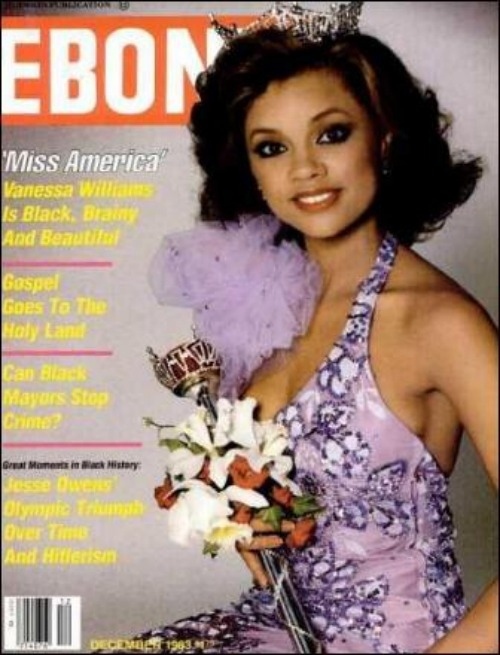
Welcome to the 3 day weekend POU!

Our final historic pop culture moment comes from 1983:
Vanessa Williams crowned Miss America.
The first African Americans to appear in the Miss America Pageant came onstage as ‘slaves’ for a musical number in 1923. It was not until 1970 that black women were even allowed to compete. That year, Iowa’s Cheryl Brown, won a state title and made it to Atlantic City as a contestant. Lencola Sullivan, Miss Arkansas 1980, was the first African American to make it to the top five. In 1984 Vanessa Williams became the first black Miss America, beginning the year as one of the best Miss Americas ever, in the eyes of many pageant insiders, but ending her reign mid-year amidst scandal.
The pageant’s long history of excluding women of color dates from its beginnings. At some point in the 1930s, it was formalized in the notorious rule number seven of the Miss America rule book. Instituted under the directorship of Lenora Slaughter, rule number seven stated that “contestants must be of good health and of the white race.” As late as 1940, all contestants were required to list, on their formal biological data sheet, how far back they could trace their ancestry. In the pageant’s continual crusade for respectability, ancestral connections to the Revolutionary War or perhaps the Mayflower would have been seen as a plus.
When Vanessa Williams won the crown 63 years after its inception, she not only made history as the first African-American to win it, she was also the first Miss America to receive hate mail and death threats. She also encountered criticism from certain segments of the black community who questioned whether her green eyes and light skinned features made her black enough.
She would say later in an interview with People:
“I was getting hate mail from white people who hate black people and mail from black people who said, ‘You’re not really black, because you don’t look black.’ I expected mail from the KKK and other psycho groups but not from the black community. I went on some talk shows where women would say, ‘The only reason you won is because you have green eyes and light skin.’ I didn’t like having my accomplishments negated because of the way I looked. That was harder to live with than anything else.”
Williams later commented that she was one of five minority contestants that year, noting that ballet dancer Deneen Graham “had already had a cross burned on her front yard because she was the first black Miss North Carolina [1983].”
Despite the pressure and ignorance, she was booked for more appearances than any other previous contestant.
Ten months into her reign as Miss America, Williams received an anonymous phone call stating that nude photos of her (taken before her pageant days) would be published in Penthouse. The publication of these photos ultimately led to her resignation as Miss America.
Hugh Hefner, the publisher of Playboy, was initially offered the photos, but turned them down, stating: “The single victim in all of this was the young woman herself, whose right to make this decision was taken away from her. If she wanted to make this kind of statement, that would be her business, but the statement wasn’t made by her.” Penthouse published the photos without her permission in 1984, however, in what the PBS documentary Miss America described as “the most successful issue of Penthouse magazine ever printed, netting publisher Bob Guccione a windfall profit of $14 million.”
According to Essence magazine, Williams “was forced to resign from her title as she faced public shaming and bullying from the public at large.” Williams herself later described these events as “the betrayal, and the humiliation, that happened to me on a grand scale.” She also noted that her parents were equally the subject of harassment at the time. She was given 72 hours to make a decision and later stated that “the heightened spectacle and circus of it all was kind of crazy. I had people saying ‘Fight for the crown! Fight for the crown!’ and people chanting ‘Don’t give it up! Don’t secede!’ ” Williams also later noted that the situation was particularly hard on her mother Helen, who felt that she should not resign as Williams had performed her “duties and excelled at everything I was asked to do plus doing 50% more of appearances that were not scheduled because I was the first African American Miss America.” Helen was also upset that “the pageant did not come to my support, they felt I needed to resign.
22 years later, The Miss America Pageant formally apologized to Vanessa and her mother Helen for their lack of support. A fitting tribute to the most successful, popular Miss America in history.

